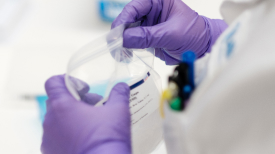- Cancer Care Team
Cancer Care Team
To deliver optimal patient outcomesProducts and Services
Cancer Type
Supplies & Tools
Scientific Focus
- Biopharma Partners
- Patients
- Education & Events
- Login
- Contact Us
Test Details
 Cancer Type
Cancer Type
Colorectal cancer (CRC), Gastric, Lynch syndrome
 Technology Used
Technology Used
Molecular
 Turnaround Time
Turnaround Time
35 - 42 days
Use
Can confirm a clinical diagnosis of HNPCC and allow early diagnosis in family members, guiding preventive measures. Hereditary nonpolyposis colorectal cancer (HNPCC) is an autosomal-dominant, genetically heterogeneous syndrome caused by heterozygous mutations in mismatch repair genes (MMR). HNPCC is estimated to account for 4% to 6% of colorectal cancer and is characterized by early onset, a predominant proximal location of colon cancer, multiple primary cancers, and significantly improved survival when compared stage for stage to sporadic colon cancer survival rates. EPCAM gene accounting for an estimated 1% to 3% of all detectable HNPCC syndrome mutations. Studies indicate that large deletions in the end of this gene can lead to a loss of MSH2 expression and result in HNPCC. Genetic testing can confirm the diagnosis of HNPCC and can also identify presymptomatic individuals among the patient's relatives.
Test Includes
Deletion/duplication analysis of the terminal region of the EPCAM gene
Limitations
Copy number variations are assessed by multiple-ligation-probe amplification assay (MLPA) to detect deletions and duplications of exons 8 and 9 in the EPCAM gene. Copy number analyses are designed to detect single exon, multi-exon, and full gene deletions or duplications. These analyses may not detect certain genomic rearrangements, such as translocations (balanced or unbalanced), inversions, or some partial exon rearrangements. This assay cannot determine exact breakpoints of deletions or duplications detected.
This test is not intended to detect somatic variants. Bone marrow transplantation may affect the outcome of these results. Please contact LabCorp to discuss testing options at 1-800-345-GENE.
This test was developed, and its performance characteristics determined, by LabCorp. It has not been cleared or approved by the US Food and Drug Administration (FDA).
Methodology
Multiplex ligation-dependent probe amplification (MLPA)
Specimen Requirements
Information on collection, storage, and volume
Specimen
Whole blood
Volume
7 mL
Minimum Volume
4 mL
Container
Lavender-top (EDTA) tube
Storage Instructions
Maintain specimen at room temperature.
Causes for Rejection
Container broken or leaking; container not labeled; improper anticoagulant
Related Tests
Find more tests related to this one.





